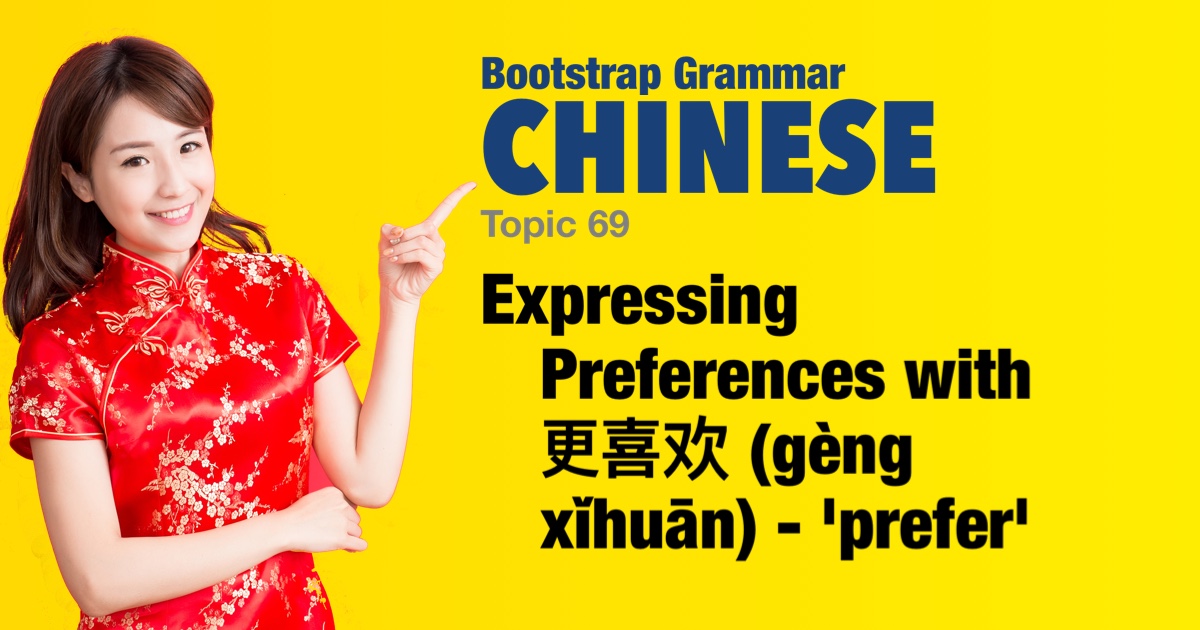Chinese grammar - Expressing Preferences with 更喜欢 (gèng xǐhuān) - 'prefer' |
|||
|
|||
In Chinese, to express a preference for one option over another, you can use the pattern: — [subject] + 更喜欢 (gèng xǐhuān) + [option A] + 而不是 (ér bú shì) + [option B] This pattern is used to indicate that the subject "likes [option A] more" or "prefers [option A]" rather than [option B]. It clearly contrasts two options, emphasizing the subject's stronger preference for the first option over the second. • 更喜欢 (gèng xǐhuān) means 'to prefer' or 'to like more' • 而不是 (ér bú shì) means 'rather than' or 'instead of' and is used to introduce the less preferred option. |
| Examples: | |
|
我更喜欢猫而不是狗。
wǒ gèng#xǐhuān māo érbúshì gǒu. I prefer cats rather than dogs.
|
|
|
他更喜欢喝茶而不是喝咖啡。
tā gèng#xǐhuān hē chá érbúshì hē kāfēi. He prefers drinking tea rather than drinking coffee. |
|
|
我们更喜欢在家吃饭而不是出去吃。
wǒmen gèng#xǐhuān zàijiā chīfàn érbúshì chūqù chī. We prefer eating at home rather than going out to eat.
|
|
|
她更喜欢读书而不是看电视。
tā gèng#xǐhuān dú shū érbúshì kàn diànshì. She prefers reading rather than watching TV. |
|
|
孩子们更喜欢玩游戏而不是做作业。
háizimen gèng#xǐhuān wán yóuxì érbúshì zuò zuòyè. The children prefer playing games rather than doing homework.
|
|
|
我更喜欢吃水果而不是吃零食。
wǒ gèng#xǐhuān chī shuíguǒ érbúshì chī língshí. I prefer eating fruits rather than snacks.
|
|
|
他更喜欢骑自行车而不是开车。
tā gèng#xǐhuān qí zìxíngchē érbúshì kāi chē. He prefers cycling rather than driving.
|
|
|
我们更喜欢去海边而不是去山里。
wǒmen gèng#xǐhuān qù hǎibiān érbúshì qù shānlǐ. We prefer going to the beach rather than the mountains.
|
|
|
她更喜欢看书而不是看电影。
tā gèng#xǐhuān kàn shū érbúshì kàn diànyǐng. She prefers reading books rather than watching movies. |
|
|
我更喜欢在图书馆学习而不是在家学习。
wǒ gèng#xǐhuān zài túshūguǎn xuéxí érbúshì zài jiā xuéxí. I prefer studying in the library rather than studying at home. |
|
|
他们更喜欢听音乐而不是跳舞。
tāmen gèng#xǐhuān tīng yīnyuè érbúshì tiào wǔ. They prefer listening to music rather than dancing.
|
|
|
你更喜欢吃中国菜还是吃西餐?
nǐ gèng#xǐhuān chī zhōngguó cài háishì chī xīcān? Do you prefer eating Chinese food or Western food?
|
|
|
老师更喜欢让学生讨论而不是直接回答。
lǎoshī gèng#xǐhuān ràng xuéshēng tǎolùn érbúshì zhíjiē huídá. The teacher prefers having students discuss rather than answering directly.
|
|
|
我更喜欢跟朋友一起去旅游而不是独自旅行。
wǒ gèng#xǐhuān gēn péngyǒu yìqǐ qù lǚyóu érbúshì dúzì lǚxíng. I prefer traveling with friends rather than traveling alone.
|
|
|
她更喜欢做有意义的工作而不是赚很多钱。
tā gèng#xǐhuān zuò yǒu#yìyì#de gōngzuò érbúshì zhuàn hěn#duō qián. She prefers doing meaningful work rather than making a lot of money.
|
|
 |
|



